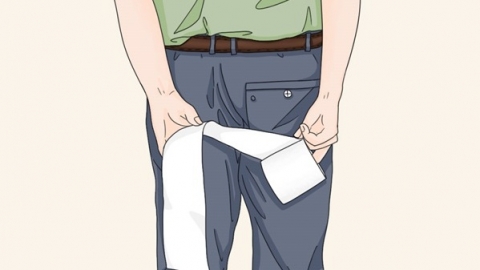What happens if hemorrhoids become severe?
When hemorrhoids become severe, the following conditions generally appear: worsened rectal bleeding, prolapsed and incarcerated hemorrhoidal masses, severe pain, anemia, and perianal infection. If any abnormalities occur, prompt medical attention is recommended. Detailed explanations are as follows:

1. Worsened Rectal Bleeding: In severe hemorrhoids, increased bleeding occurs during bowel movements due to ruptured veins. Blood may spurt out or leave heavy traces on toilet paper after defecation, even dripping. Long-term recurrent rectal bleeding affects daily life and hygiene and also indicates worsening of the condition.
2. Prolapse and Incarceration of Hemorrhoidal Masses: In the later stages of internal or mixed hemorrhoids, the hemorrhoidal masses may prolapse from the anus. Initially, they can retract on their own, but in severe cases, they cannot be retracted and become incarcerated at the anal opening. This situation hinders local blood circulation, leading to swelling and increased congestion of the hemorrhoidal masses.
3. Severe Pain: The incarcerated hemorrhoidal masses obstruct blood flow, leading to thrombosis and severe pain. Pain intensifies when standing, walking, or sitting. Accompanied by local tissue necrosis, the pain persists and is difficult to relieve, significantly affecting normal activities and rest.
4. Anemia: Long-term chronic rectal bleeding leads to significant loss of iron, causing iron-deficiency anemia. Symptoms such as dizziness, fatigue, palpitations, and shortness of breath may appear. In severe cases, it can affect heart function and reduce the body's resistance.
5. Perianal Infection: After hemorrhoidal prolapse, the skin around the anus becomes harder to clean, making it easier for bacteria to grow. If the surface is damaged, bacterial invasion can cause infection, leading to complications such as perianal abscess and anal fistula, further worsening the condition and increasing treatment difficulty.
In daily life, one should maintain a regular schedule and avoid prolonged sitting or standing; consume more fiber-rich foods such as vegetables, fruits, and whole grains to maintain smooth bowel movements; develop good bowel habits and avoid prolonged defecation; if symptoms such as rectal bleeding or pain occur, seek timely medical examination and treatment to prevent worsening of hemorrhoids.








